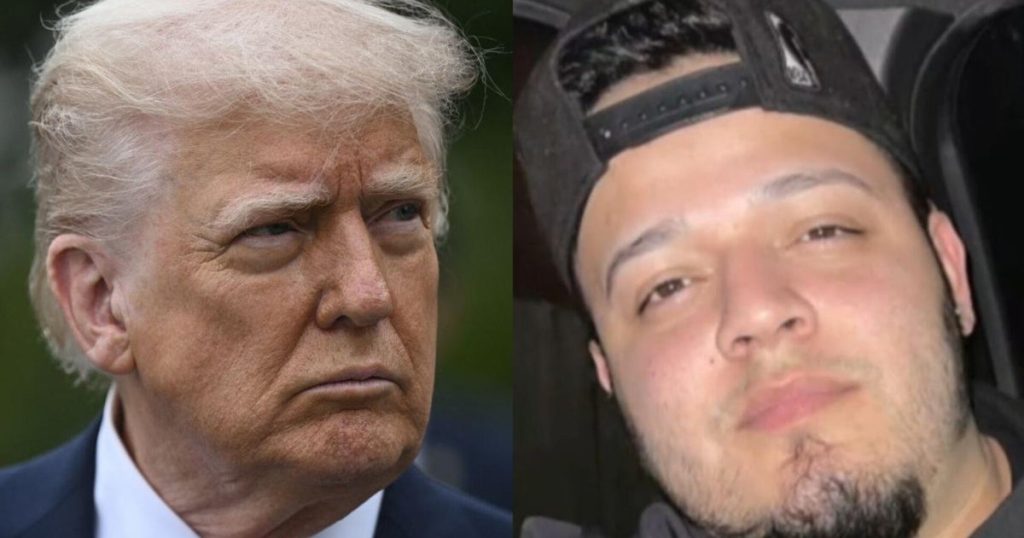A federal judge has temporarily paused her order for the Trump administration to provide crucial documentation regarding the deportation of Kilmar Abrego Garcia, a Salvadoran man erroneously sent back to El Salvador last month. The stay was put in place just one day after Judge Paula Xinis accused the administration of showing “bad faith” in complying with court orders. As legal battles continue, the focus remains on Garcia’s return to the U.S., with the judge’s directives remaining at the forefront of the discourse.
| Article Subheadings |
|---|
| 1) Background of Kilmar Abrego Garcia’s Case |
| 2) Judge Xinis’ Recent Rulings |
| 3) Government’s Position and Challenges |
| 4) Legal Implications of the Case |
| 5) Public Reaction and Future Developments |
Background of Kilmar Abrego Garcia’s Case
In 2011, Kilmar Abrego Garcia, a Salvadoran national, entered the United States illegally, seeking to escape the violence and persecution rampant in his home country. Over the years, his life took a turn when he was detained in a recent sweep by immigration authorities. This resulted in a mass deportation initiative orchestrated by the Trump administration, which inadvertently included Garcia, leading to his return to El Salvador in March 2023. His deportation occurred despite a prior court ruling in 2019 that barred his removal due to the potential threat of gang violence he would face upon returning.
Judge Xinis’ Recent Rulings
Recently, Judge Paula Xinis expressed frustration with the Trump administration, highlighting its failure to comply with previous discovery requests regarding Garcia’s case. On Tuesday, she issued a pointed order condemning the government for what she termed a “willful and bad faith refusal” to fulfill discovery obligations. In a critical ruling, she set a deadline for the government to provide necessary information, reflecting the urgency surrounding Garcia’s situation. However, following the government’s request for a one-week stay, she issued a temporary pause on her directives, raising questions about the motivations behind the stay and what it signifies for the case moving forward.
Government’s Position and Challenges
The Justice Department, in response to the unfolding legal drama, has maintained silence regarding specific details of the case owing to sealed filings. Officials argue that much of the information they possess is protected under claims of state secrets and attorney-client privilege. Yet, Judge Xinis has challenged these assertions, demanding that pertinent details be provided. Complicating matters further, the administration has labeled Garcia as associated with the notorious MS-13 gang, a claim his lawyers vehemently deny, asserting that he has never been formally charged with any crime. This ongoing standoff illustrates the complexities and high stakes involved in the case.
Legal Implications of the Case
Garcia’s case has implications that extend beyond his personal situation, touching on broader themes of immigration policy and judicial authority. The Department of Justice’s claims of state secrets and the court’s challenge to that defense play a crucial role in the evolving legal landscape. Additionally, a three-judge panel from the 4th U.S. Circuit Court of Appeals criticized the administration for failing to act decisively in mitigating Garcia’s situation, suggesting that the government bears responsibility in facilitating his return. The legal ramifications of Garcia’s deportation are significant, potentially influencing how similar cases are handled in the future.
Public Reaction and Future Developments
The public response to Garcia’s deportation and subsequent legal battles has been one of concern and advocacy. Family members, community leaders, and immigration reform advocates have rallied around his case, urging for swift action to rectify the mistake. The media coverage has increased awareness regarding the complexities of immigration law and the impact of deportation on individuals. As developments unfold, all eyes are on the judicial proceedings, demonstrating how ramifications on Garcia’s case could reverberate throughout the immigration system.
| No. | Key Points |
|---|---|
| 1 | Judge Xinis temporarily halted the order for the Trump administration to provide evidence related to Kilmar Abrego Garcia’s case. |
| 2 | The Justice Department has remained silent on specific details regarding the case due to sealed legal filings. |
| 3 | Garcia’s deportation was labeled an administrative error, yet the administration has not returned him to the U.S. |
| 4 | The implications of Garcia’s case extend into issues surrounding immigration law and judicial authority in deportation matters. |
| 5 | Public advocacy is mounting for Garcia’s return, reflecting growing concerns about deportation practices. |
Summary
The ongoing legal battle surrounding Kilmar Abrego Garcia’s deportation highlights significant challenges within the U.S. immigration system. As Judge Paula Xinis navigates complex legal arguments regarding government compliance and individual rights, the outcome of this case could have far-reaching implications. The public’s response underscores the urgency for comprehensive immigration reform and humane treatment of individuals caught in the legal crossfire.
Frequently Asked Questions
Question: Who is Kilmar Abrego Garcia?
Kilmar Abrego Garcia is a Salvadoran man who entered the United States illegally in 2011 and was recently deported to El Salvador by the Trump administration.
Question: What legal actions have been taken regarding Garcia’s deportation?
A federal judge has ordered the Trump administration to provide information on the circumstances surrounding Garcia’s deportation, which the administration has resisted, leading to ongoing legal challenges.
Question: What implications does this case have for U.S. immigration policy?
The case raises questions about judicial authority in immigration matters and the responsibilities of the government in ensuring that deportations are conducted fairly and legally.


